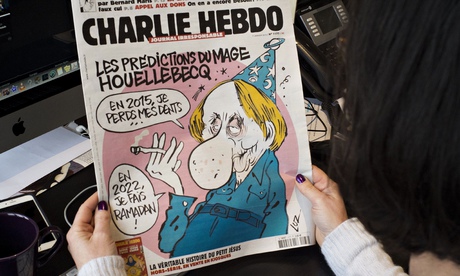
The massacre at Charlie Hebdo was devastatingly effective. The terrorists objected to jokes about their religion, so they killed the jokers. Now nobody is laughing.
Sombre demonstrations do not defeat this assault on free speech. For comedy is killed as stone dead by collective sadness as it is by executing cartoonists.
How can we assert the survival of satire and artistic freedom in the wake of such a brutal totalitarian act?
One answer can be found on the cover of the latest issue of Charlie Hebdo itself, which caricatures French novelist Michel Houellebecq.
Here’s a way that we can not just assert but enact freedom, and the right to laugh. It is to see the humour of Houellebecq. His latest novel Soumission (Submission), just published, imagines a France ruled by an Islamic government. It has been accused by some of siding with far-right paranoia. But I can’t wait to read it because I think Houellebecq is currently Europe’s most exciting novelist. And funniest, if you can stomach his true characteristic, which is not “Islamophobia” but an incredibly pungent melancholy.
I was laughing at Houellebecq just a couple of evenings before the Charlie Hebdo murders, as I watched the mock documentary The Kidnapping of Michel Houellebecq, in which the weedy, unhealthy, self-pitying novelist is taken prisoner by a bunch of toughs who turn out to be interested in his books and ideas. He finally loses his temper over a debate with them about Tolkien. “Did I say I was tolerant?” he yells. Yet he seems happier in their care than he did as a free man on the streets of Paris at the start of the film.
Certainly, his lifestyle as a kidnap victim looks more fulfilling than the life he imagines for himself in his novel The Map and the Territory, in which he lives in a chaotic bungalow with a fridge full of charcuterie before something truly awful happens to him. Houellebecq is harsher on himself than on any one else. He depicts himself as a sad case, very much like the drawing by Charb on the cover of Charlie Hebdo.
The power of Houellebecq’s writing is that of a contemporary Flaubert, obsessed with the banal minutiae of everyday life, extracting the tang of reality from the pantomime of fiction. Provocative ideas are part of his dangerous, intelligent goading of the reader – his determination to make art matter.
Like Charlie Hebdo, he refuses to leave Islam out of his free speaking. But there’s a danger of misunderstanding the very nature of art, if we don’t see why these daring creators are drawn to such a controversial subject. It is precisely because Islam is a dangerous subject that bold cartoonists and writers can’t leave it alone. Make something taboo and you make it into material. Novelists, like cartoonists, have long been drawn to the offensive joke. Philip Roth’s great comic novels have got him accused of everything from “Jewish anti-semitism” to misogyny, while Milan Kundera sees comedy as the ultimate dissidence in his novel The Joke. One of the most eloquent statements about Charlie Hebdo was naturally by Salman Rushdie. Testing the limits of free thought is one of the most important things that art can do.
Today it is Houellebecq who risks the most as a novelist, and that’s what makes him so entertaining and serious. Mourning Charlie Hebdo will mean nothing if we don’t see the funny side of Submission.

